
Colombia, Latin America: Week in Review, Mexico
Latin American Leaders Criticize Prop 19; Says California Sends Wrong Message
October 27, 2010 By Staff
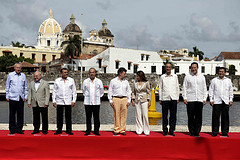
Latin American leaders gathered in Cartagena Tuesday.
Today in Latin America
Top Story — Several Latin American leaders criticized California’s controversial Proposition 19, saying that if passed the measure would send a contradictory message from the United States.
The measure was a major talking point Tuesday during a three-day summit hosted by Colombian President Juan Manuel Santos. Presidents Felipe Calderón of Mexico, Porfirio Lobo of Honduras, Álvaro Colom of Guatemala and Laura Chinchilla of Costa Rica attended the summit.
“How can I tell a farmer in my country that if he grows marijuana, I’ll put him in jail, when in the richest state of the United States it’s legal to produce, traffic and consume the same product?” Santos told Colombia’s Caracol radio, according to The Los Angeles Times.
Santos, who last month asked U.S. President Barack Obama to support a regional strategy to help lower violence related to the drug trade, said that the world’s governments need to act consistently. Santos added that if the measure passed, then a review of the principles that have long aided efforts in combatting the drug trade with support from the U.S. would be in order.
“It’s confusing for our people to see that, while we lose lives and invest resources in the fight against drug trafficking, in consuming countries initiatives like California’s referendum are being promoted,” Santos said, according to The Miami Herald.
The Obama administration has emphasized that the federal government will continue to pursue its counter-drug policies and is looking into ways to respond to the measure if passed. The measure conflicts with U.S. federal law that classifies marijuana as an illegal drug.
The Proposition 19 initiative would allow people 21 years and older to possess as much as an ounce of marijuana and allow local governments to regulate and tax sales of the substance.
Just Published at the Latin America News Dispatch
- Peruvian presidential candidate Ollanta Humala outlined his nationalist program on Thursday in New York, saying it would transform Peru from a mineral exporting country to an industrialized country that privileges the internal market.
- With it the nation’s toughest state immigration law, Arizona has taken center stage in the national debate about immigration as the midterm elections approach. Molly O’Toole reports from Arizona in a three-part series.
- The threat to freedom of the press posed by Mexico’s drug cartels begs a bilateral response, a panel of journalists and press freedom groups said in New York Tuesday. Andrew O’Reilly has more.
- Protesters demand restraints on federal involvement in immigration enforcement in New York City jails, reports Alison Bowen in Beyond Borders.
Headlines from the Western Hemisphere
North America
- Former governor Robert L. Ehrlich Jr. sought Tuesday to highlight differences with Gov. Martin O’Malley on immigration, saying the issue had “become more of a hot button” since their recent debate at The Washington Post.
- Amid controversy over U.S. immigration policy, Libertarian Party Chair Mark Hinkle says the proper way to end undocumented immigration is to re-legalize immigration.
- Mexican authorities will investigate allegations that a former state attorney general worked for a drug cartel and was involved in ordering assassinations, the federal attorney general’s office said.
- Pop singer Madonna is opening the first of a chain of fitness centers around the world, to be known as Hard Candy Fitness global gyms, in Mexico City.
- Acting Essex County Prosecutor Robert D. Laurino announced Monday that Bartholomew Bradley, 53, of Poughkeepsie, N.Y., and Newark, has been charged with the murder of a homeless Guatemalan immigrant.
Caribbean
- The U.N. General Assembly has voted overwhelmingly to condemn almost a half-century of U.S. sanctions against Cuba, demanding an end to what member states say is a cruel Cold War anachronism that only hurts ordinary people.
- The Cuban authorities have set out in detail new rules and taxes for the self-employed and small businesses as they move to overhaul the economy.
- Gunmen shot up and robbed a bus carrying journalists covering the campaign of a Haitian presidential candidate, killing the driver and injuring a reporter, police said Tuesday.
- Health officials in Haiti say nearly 300 people are now known to have died in a cholera outbreak in the country.
- Puerto Rico’s governor on Monday announced plans to cut business and income taxes by more than a $1 billion annually over the next seven years in an attempt to jumpstart the U.S. territory’s economy.
Central America
- A California woman who fled a violent husband and entered the United States illegally in 1995 faces imminent deportation to El Salvador, where her husband has been looking for her, her lawyer said Monday.
- To check rising rural poverty and hunger in Nicaragua, the United Nations Food and Agriculture Organization (FAO) is helping the country’s government to support small-scale farmers boost their production of beans, maize, rice and other staple crops.
- Cielo Paraiso will open the first 18 hole championship level golf course in Boquete, Panama in January 2011.
Andes
- Police say that a mob in rural Bolivia has killed a couple suspected of casting spells on neighbors.
- A new deal has been secured with Colombia’s coal production by Colombia Clean Power & Fuels, Inc., a Texas company with an active subsidiary in the Latin American country.
- U.S. refining and gas station company Citgo is an undervalued, bad business that its owner Venezuela is currently stuck with, President Hugo Chávez said on Monday.
Southern Cone
- A third member of an Argentine railworkers union was arrested Tuesday as a suspect in the shooting death of a protester during a demonstration by laid-off railway employees.
- A killer bacteria resistant to antibiotics has infected 183 hospitalized people in Brasilia and is similar to another bug found in hospitals in Chicago.
- Public perceptions of government corruption were lowest among Latin American nations in Chile and Uruguay, according to a study by Transparency International.
- The Paraguayan government may purchase private land to create a reserve for the Ayoreo Totobiegosode tribe, which is being displaced by cattle ranching.
Image: Gobierno de Guatemala @ Flickr.
Subscribe to Today in Latin America by Email
< Previous Article
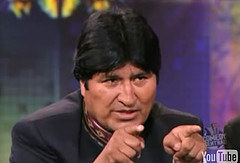
October 26, 2010 > Staff
Evo Morales Visits Iran To Boost Ties And Promote Investment
Next Article >

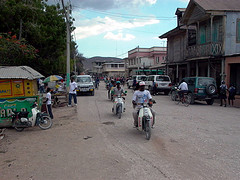
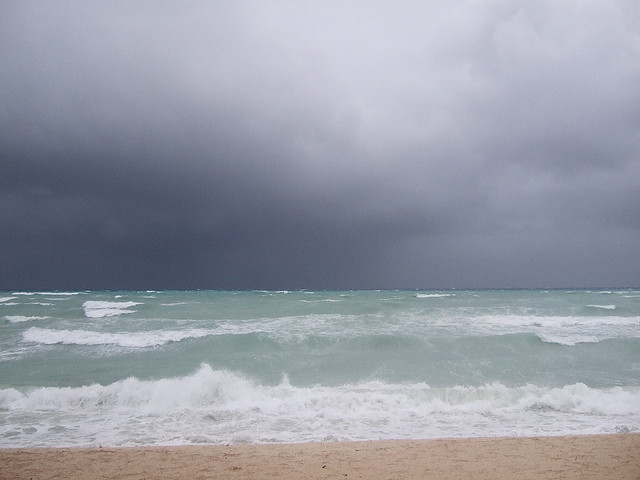

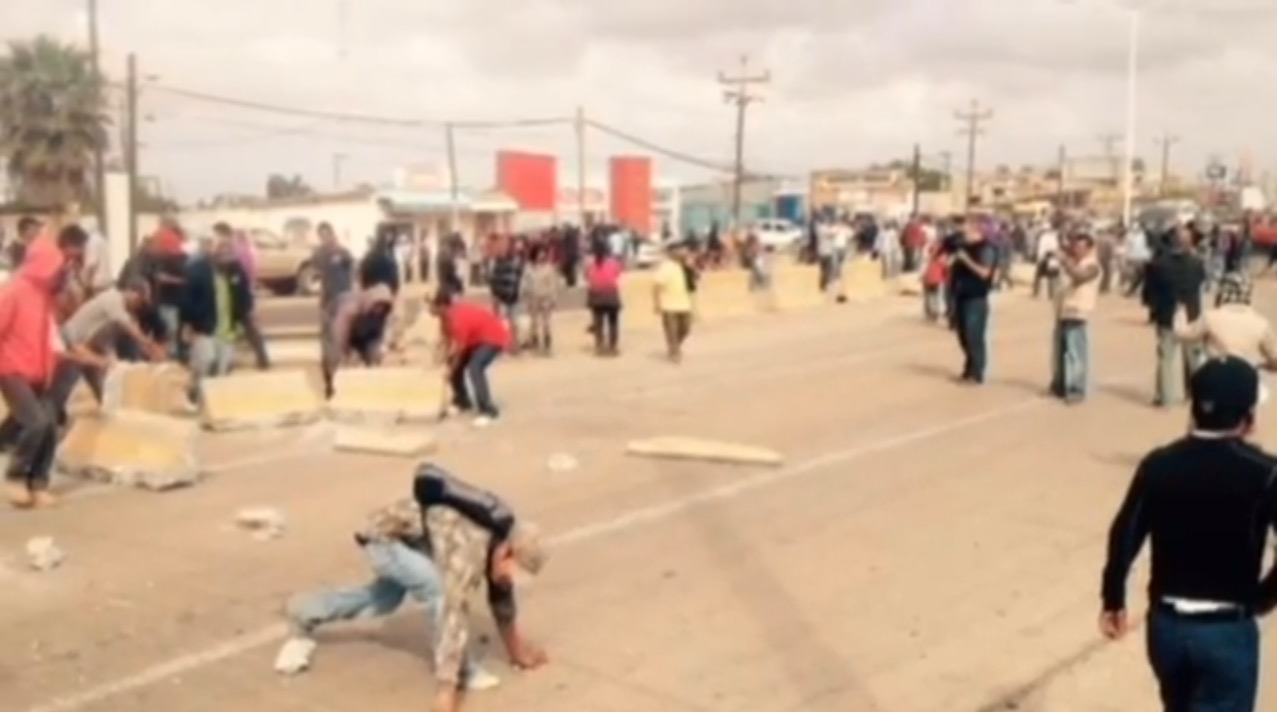
3 Comments
US Government owned patent # 6630507 (Cannabinoids as antioxidants and neuroprotectants) is a contradictory message from the United States.
AND
Mexico just legalized small amounts of all drugs, so neither Government has any room to talk.
[…] Latin American countries are criticizing Prop 19, the ballot initiative that would legalize marijuana in California. Colombian President Manuel […]
[…] the popular drug would lead to a reduction in incarceration rates in the United States, Mexican President Felipe Calderón and other Latin American leaders have said that decriminalizing marijuana sends a contradictory message to countries that are battling drug […]
Comments are closed.